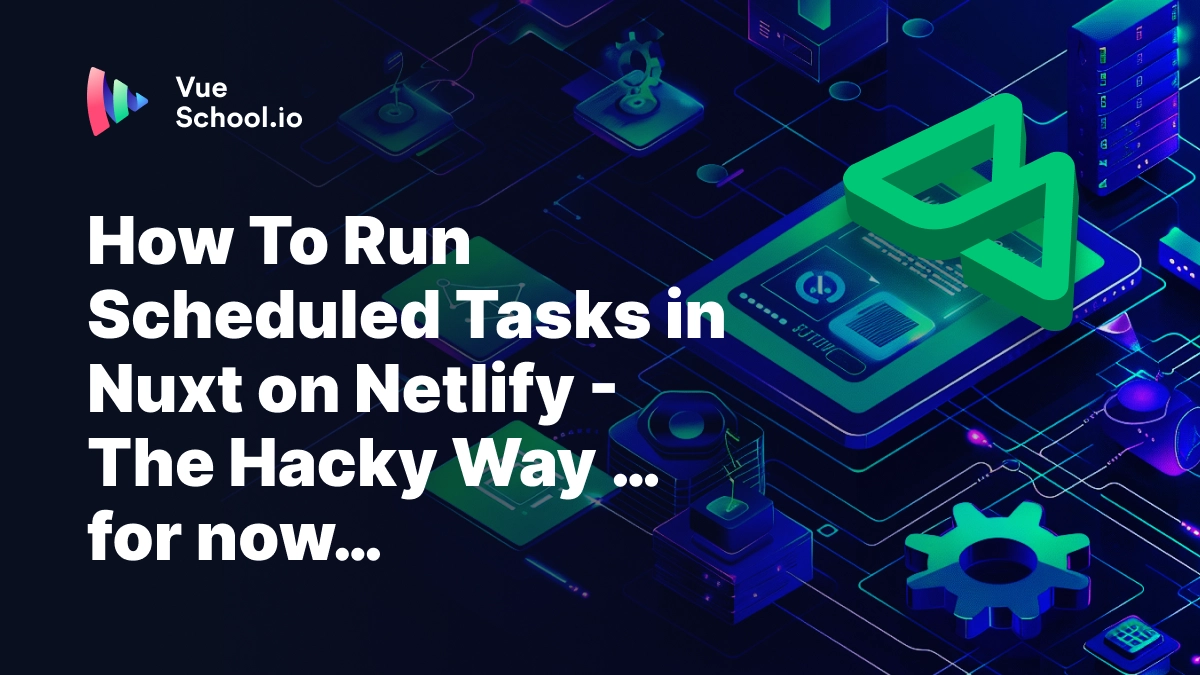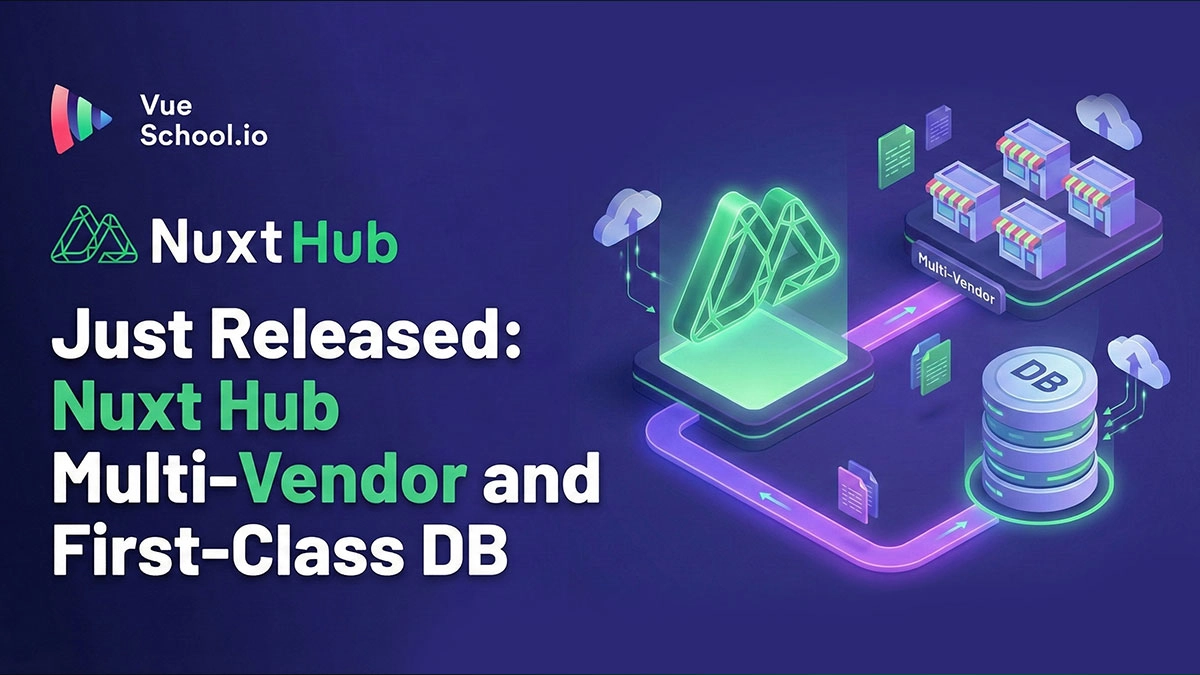How To Run Scheduled Tasks in Nuxt on Netlify – The Hacky Way … for now…

Nitro (and thus Nuxt) has experimental support for scheduled tasks. However, if you're deploying to Netlify, you'll quickly discover that Nitro's scheduledTasks feature doesn't work yet. Don't worry though - there's a workaround that's actually quite elegant!
The Problem with Nitro's Scheduled Tasks
Nitro's experimental tasks feature allows you to define scheduled jobs directly in your Nuxt application:
// nuxt.config.ts
export default defineNuxtConfig({
nitro: {
experimental: {
tasks: true,
},
scheduledTasks: {
"0 0 * * *": ["daily:cleanup"], // This won't work on Netlify
},
},
});
While this works great locally and on some platforms, Netlify doesn't support Nitro's scheduled tasks... yet.
The Solution: Netlify Scheduled Functions + Nuxt API Endpoints
The workaround is surprisingly simple and follows good architectural principles:
- Create a Netlify Scheduled Function that runs on your desired schedule
- Create a Nuxt API endpoint that performs your scheduled task
- Use environment variables to secure the endpoint
- Have the scheduled function ping the API endpoint
This approach has several benefits:
- ✅ Works immediately on Netlify
- ✅ Keeps your task logic in your Nuxt app
- ✅ Easy to test and debug
- ✅ Secure with proper authentication
- ✅ Can be easily migrated to native Nitro tasks when Netlify supports them
How to Implement Scheduled Tasks in Nuxt on Netlify
Step 1: Create Your Task Logic as a Nuxt API Endpoint
First, let's create an API endpoint that will handle our scheduled task:
// server/api/tasks/example-task.post.ts
export default defineEventHandler(async (event) => {
const body = await readBody(event);
// Validate the secret key
const secretKey = useRuntimeConfig().taskSecret;
if (!secretKey) {
throw createError({
statusCode: 500,
statusMessage: "Secret must be set",
});
}
if (body.secret !== secretKey) {
throw createError({
statusCode: 401,
statusMessage: "Unauthorized",
});
}
// Your actual task logic here
const now = Date.now();
console.log("Running example record task: ", now);
// Example: Store something in KV storage
const storage = useStorage("example:record");
await storage.setItem(String(now), now);
return {
success: true,
timestamp: now,
message: "Task completed successfully",
};
});
Step 2: Create a Netlify Scheduled Function
Create a Netlify function that will call your API endpoint:
// netlify/functions/example-task.mts
import type { Config } from "@netlify/functions";
import { $fetch } from "ofetch";
export default async (req: Request) => {
const { next_run } = await req.json();
console.log("Scheduled function triggered. Next run:", next_run);
try {
// Call your Nuxt API endpoint
const response = await $fetch(`${process.env.URL}/api/tasks/example-task`, {
method: "POST",
body: {
secret: process.env.NUXT_TASK_SECRET,
},
});
if (!response.success) {
throw new Error("Task failed", { cause: response });
}
console.log("Task completed:", response);
} catch (error) {
console.error("Task failed:", {
cause: error,
});
}
};
// Run every hour
export const config: Config = {
schedule: "@hourly",
};
Step 3: Configure the Environment Variable
Add the required environment variables to your Netlify site:
NUXT_TASK_SECRET- A secure random string to authenticate task requestsURL- Your site URL (Netlify automatically provides this)
You can set these in your Netlify dashboard under Site Settings > Environment Variables, or use the Netlify CLI:
# Generate a secure random string and set it as an environment variable in Netlify
netlify env:set NUXT_TASK_SECRET $(openssl rand -base64 25)
Step 4: Add Runtime Config
Update your Nuxt config to include the runtime config:
// nuxt.config.ts
export default defineNuxtConfig({
compatibilityDate: "2025-07-15",
devtools: { enabled: true },
runtimeConfig: {
taskSecret: null, // this will be set to the environment variable NUXT_TASK_SECRET under the hood
},
});
Step 5: Configure netlify.toml (Optional)
You can also configure your scheduled function in netlify.toml
(instead of in the scheduled function):
# netlify.toml
[functions."example-task"]
schedule = "@hourly"
Testing Your Setup
Local Testing
- Test the API endpoint directly:
Use curl to test the API endpoint directly:
curl -X POST <http://localhost:3000/api/tasks/example-task> \\
-H "Content-Type: application/json" \\
-d '{"secret":"your-secret-key"}'
or use the Nuxt Devtools:

screenshot of making the api request in the nuxt devtools
- Test the Netlify function locally:
npx netlify dev
npx netlify functions:invoke example-taskProduction Testing
Once deployed, you can view the scheduled function runs from the logs.

Cron Expression Examples
Here are some common cron expressions you can use:
// Every minute (for testing)
schedule: "* * * * *";
// Every hour
schedule: "@hourly";
// Every day at midnight UTC
schedule: "@daily";
// Every Monday at 9 AM UTC
schedule: "0 9 * * 1";
// Every first day of the month at 2 AM UTC
schedule: "0 2 1 * *";
Use crontab.guru to easily generate and test cron expressions.
Security Considerations
- Always validate the secret key in your API endpoints
- Don't log sensitive information like secret keys
- Use strong, random secret keys and rotate them regularly
Limitations
- The task is limited to the timeout of the Netlify function (10 seconds by default - but you can request an increase in the Netlify support forum)
Monitoring and Debugging
Netlify Function Logs
You can view logs for your scheduled functions in the Netlify dashboard under Functions > [Your Function] > Function log.
Nuxt Server Logs
Your Nuxt API endpoint logs will appear in your site's function logs (function name is usually server handler) since Nuxt runs as a Netlify function.
Migration Path
When Netlify eventually supports Nitro's scheduled tasks, migration will be straightforward:
- Remove the Netlify scheduled function
- Move your task logic from the API endpoint to a proper Nitro task
- Remove the authentication code (no longer needed)
- Update your
nuxt.config.tsto use only Nitro'sscheduledTasks
Conclusion
While we wait for native Nitro scheduled task support on Netlify, this workaround provides a robust solution that's actually quite elegant. It follows good separation of concerns, is easy to test, and provides a clear migration path for the future.
The combination of Netlify's scheduled functions with Nuxt API endpoints gives you all the power you need for automated tasks, with the added benefit of being able to manually trigger tasks through your API if needed.
If you’d like to learn more about running a robust Nuxt app, checkout the complete course Mastering Nuxt.
Resources
This workaround was tested with Nuxt 4.0.1 and Netlify Functions. As both platforms evolve, some details may change. Always refer to the official documentation for the latest information.
Start learning Vue.js for free

Comments
Latest Vue School Articles
Just Released: Nuxt Hub Multi-Vendor and First-Class DB

Vue.js – 2025 In Review and a Peek into 2026

Our goal is to be the number one source of Vue.js knowledge for all skill levels. We offer the knowledge of our industry leaders through awesome video courses for a ridiculously low price.
More than 200.000 users have already joined us. You are welcome too!
© All rights reserved. Made with ❤️ by BitterBrains, Inc.



